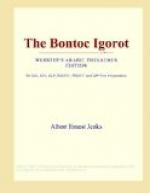There is no doubt that the desire to be considered brave and manly has come to be a factor in Bontoc head taking. In my presence an Igorot once told a member of ato Ungkan that the men of his ato were like girls, because they had not taken heads. The statement was false, but the pronounced judgment sincere. In this connection, also, it may be said that although the taking of a head is not a requisite to marriage, and they say that it does not win the men special favor from the women, yet, since it makes them manly and brave in the eyes of their fellows, it must also have its influence on the women.
The desire for exaltation in the minds of descendants also has a certain influence — young men in quarrels sometimes brag of the number of heads taken by their ancestors, and the prowess or success of an ancestor seems to redound to the courage of the descendants; and it is an affront to purposely and seriously belittle the head-hunting results of a man’s father.
There can be no doubt that head-hunting expeditions are often made in response to a desire for activity and excitement, with all the feasting, dancing, and rest days that follow a successful foray. The explosive nature of a man’s emotional energy demands this bursting of the tension of everyday activities. In other words, the people get to itching for a head, because a head brings them emotional satisfaction.
It is believed that now the people of the two sister pueblos, Bontoc and Samoki, look on war and head-hunting somewhat as a game, as a dangerous, great sport, though not a pastime. It is a test of agility and skill, in which superior courage and brute force are minor factors.
Primarily a pueblo is an enemy of every other pueblo, but it is customary for pueblos to make terms of peace. Neighboring pueblos are usually, but not always, friendly. The second pueblo away is usually an enemy. On most of our trips through northern Luzon cargadors and guides could readily be secured to go to the nearest pueblo, but in most cases they absolutely refused to go on to the second pueblo, and could seldom be driven on by any argument or force. The actual negotiations for peace are generally between some two ato of the two interested pueblos, since the debt of life is most often between two ato.
Bontoc and Samoki claim never to have sued for peace — a statement probably true, as they are by far the largest body of warriors in the culture area, and their war reputation is the worst. When one ato agrees on peace with another the entire pueblo honors the treaty.
The following peace agreements have been sought by outside pueblos in recent years of the following ato of Bontoc: Sakasakan sued for peace from Somowan, and Barlig from Pudpudchog; Tulubin, from Buyayyeng; Bitwagan, from Sipaat; Tukukan sought peace from both Amkawa and Polupo, and Sabangan also from Polupo; Sadanga, from Choko; and Baliwang, from Longfoy.




